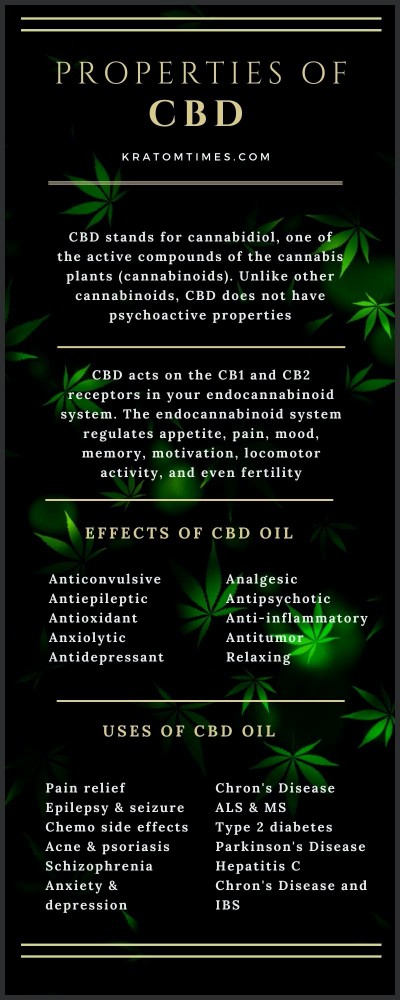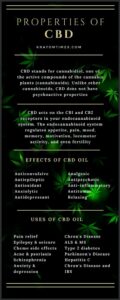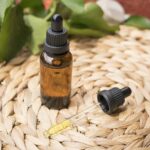CBD oil is becoming incredibly popular thanks to its amazing properties. But what exactly is CBD? Is it marijuana? Will it get me “high”? Can I become addicted to it? Can it help me with my condition? In this post, we will try to answer all these questions (and a few more), so keep reading to find out the basic facts about CBD.
What Is CBD Oil? Cannabis and Cannabinoids
Before answering that question, let us talk about cannabis and its compounds. Cannabis is a genus of plants native to central Asia that comprises 3 different species: Cannabis sativa, Cannabis indica, and Cannabis ruderalis. However, there is some dispute about the latter, C. ruderalis: many people consider it a sub-species of C. indica, while others think it is a different species with its own characteristics. In any case, all cannabis plants have the same type of active elements regardless of the species: cannabinoids.
Cannabis plants have more than 100 cannabinoids and CBD is one of them. CBD is an abbreviation for cannabidiol. Together with THC (tetrahydrocannabinol), CBD is one of the most popular cannabinoids. CBD oil is an oil with high concentrations of cannabidiol. You will find CBD oils with different concentrations of cannabidiol.
Marijuana’s psychoactive effects come from THC. Therefore, in order to be legal, cannabidiol products must contain less than 0.3% of THC (this may vary depending on the state or country). Cannabidiol usually comes from hemp, which is a variety of Cannabis sativa with a very low content of THC. In fact, you can find both CBD and hemp oil. They are different products nonetheless: hemp oil comes from the seeds of the plant, whereas CBD oil comes from the stalks, leaves, and flowers. Furthermore, hemp oil contains very little cannabidiol, sometimes even nothing. But it also seems possible to obtain cannabidiol from certain pine trees and citrus peels.
The Endocannabinoid System
Cannabinoids act on the endocannabinoid system (ECS). The endocannabinoid system is common to all animals, including humans. Humans have an endocannabinoid system, but so do cats, dogs, elephants or eagles. All mammals, birds, reptiles, and fish have an endocannabinoid system. However, you might have never heard of it before. The reason is that the ECS was first discovered in the early 1990s. But despite its being quite a novelty, the endocannabinoid system is crucial for a healthy life, both physical and mental, as it regulates appetite, pain, mood, memory, motivation, locomotor activity, and even fertility.
The endocannabinoid system comprises cannabinoid receptors, cannabinoid receptor proteins, and endocannabinoids, which are neurotransmitters our body produces naturally and that activate the cannabinoid receptors. The cannabinoids that cannabis contains act on the cannabinoid receptors in the endocannabinoid system and produce the same effects as endocannabinoids. They imitate the action of endocannabinoids, so to speak. Cannabidiol acts mostly on CB1 and CB2 receptors, which are present in the central nervous system and in peripheral tissues.
CBD Oil Effects
Like kratom, cannabidiol has many positive properties. Its use can improve many conditions and ailments, even for your pets! Its effects include:
- Anticonvulsive
- Antiepileptic
- Antioxidant
- Anxiolytic
- Antidepressant
- Analgesic
- Antipsychotic
- Anti-inflammatory
- Antitumor
- Relaxing
Furthermore, CBD can also improve some skin conditions, such as psoriasis or acne. It also alleviates nausea, boosts your immune system, or stimulates appetite, among other properties.
Uses of CBD Oil
Thanks to all these properties and effects, CBD oil can be of help in many conditions, such as:
Epilepsy and Seizures
Cannabidiol has anticonvulsant and antiepileptic properties, so it is very effective for epilepsy and seizures for both adult and infant patients. The reason for this success may be due to the action of CBD on cannabinoid receptors CB1 and CB2, which are part of the endocannabinoid system and are related to seizure modulation. In fact, the FDA has approved a cannabidiol-based drug (Epidiolex) to treat epilepsy.
Cancer and Chemotherapy Side Effects
There are studies that prove that CBD inhibits the growth of tumor cells in breast cancer. Not only that, cannabidiol also prevents the proliferation of cancer cells and even kills them. But CBD can also be effective in lung cancer and prostate cancer.
Furthermore, CBD oil counteracts the side effects of chemo: it prevents vomiting and alleviates nausea, and it has become an ally for people who must cope with chemotherapy.
Nonetheless, if you have been diagnosed with cancer, rely on the treatments proposed by your doctors and talk to them before using cannabidiol.
Anxiety and Depression
Cannabidiol has anxiolytic, relaxing, and antidepressant properties. Therefore, it can reduce anxiety, stress, and depression. The studies carried out so far about these properties seem to point out that CBD activates the action 5-HT1A neurotransmitter, increasing serotonin levels and promoting an improvement in the symptoms of anxiety and depression. Keep reading our blog to discover more remedies for anxiety and depression.
Schizophrenia
Cannabis has a bad reputation when it comes to schizophrenia. However, thanks to its antipsychotic properties, CBD can be a good alternative for managing schizophrenia. In any case, patients with schizophrenia should not change their medication without talking to their doctors.
Acne
Cannabidiol regulates the production of skin sebum, which results in significantly less acne. It also has anti-inflammatory properties that reduce the inflammation of the skin and the lesions. Many users claim that CBD oil for acne has been a miracle for them.
Psoriasis
Psoriasis is an autoimmune skin condition characterized by red patches of skin and scales. These patches usually itch and burn. Psoriasis happens when the life cycle of the skin cells speeds up and these cells build up, forming patches and scales on the skin’s surface.
Cannabidiol slows the life cycle of the skin cells, has anti-inflammatory properties, and regulates the activity of the immune system. Thus, creams rich in CBD are very effective in relieving the symptoms of psoriasis.
Chron’s Disease, Inflammatory Bowel Disease, and Ulcerative Colitis
CBD oil neutralizes the side effects of anti-inflammatory medications for Chron’s disease, inflammatory bowel disease (IBD) and ulcerative colitis (UC). Furthermore, relieves the pain, nausea, and inflammation caused by these conditions. And in the case of Chron’s disease, the antibacterial properties of CBD are also incredibly helpful.
Patients suffering from these conditions have found in CBD oil a great remedy for their symptoms but without the side effects of conventional medications.
Amyotrophic Lateral Sclerosis (ALS) and Multiple Sclerosis (MS)
ALS and MS are two types of sclerosis. While they are different diseases, they both affect the covering of the nerve fibers and have symptoms in common. Cannabidiol can help alleviate some of these symptoms and improve patient’s quality of life, as it relieves pain and spasms and boosts your immune system. Other properties of CBD, such as fighting insomnia or boosting your appetite, are also helpful for ALS and MS patients.
Type 2 Diabetes
Type 2 diabetes occurs when cells become insulin resistant and do not respond properly to the insulin they receive. As a result, the pancreas needs to produce more insulin to keep the sugar levels down. But eventually, the insulin production falls and the blood sugar levels grow rapidly until it reaches the type 2 diabetes threshold. Insulin resistance is also related to chronic inflammation, so the anti-inflammatory of cannabidiol can also be very helpful.
Parkinson’s Disease
The use of CBD oil can help alleviate dyskinesia, the involuntary movements in patients with Parkinson’s, improving their quality of life. But cannabidiol also activates the G-protein coupled receptor 6 (GPR6), which seems to play a crucial role in Parkinson’s disease. When interacting with GPR6, CBD boosts your dopamine levels, and that is very positive for Parkison’s patients, as the loss of dopamine is the main cause of this disease and its symptoms.
Hepatitis C
Hepatitis C (HCV) is a viral condition that causes inflammation of the liver. It is a very serious and dangerous disease and there is no vaccine for preventing it and a person can become re-infected since the immune system does not “remember” HCV antibodies. CBD can inhibit the virus replication, which is a great step to prevent a relapse.
Pain
CBD has potent analgesic and anti-inflammatory properties. As a result, CBD oil is helping many people suffering from fibromyalgia, different types of arthritis, or other conditions that cause pain.
Pets
The endocannabinoid system is common to all animals, not only to humans. Therefore, CBD also works in pets. In fact, one of CBD’s major uses is as a veterinary remedy. If you want to use CBD on pets, make sure you adjust the dosage to the size and weight of the animal. It is very recommendable you talk to a vet before giving CBD oil to your pets.

CBD Oil Side Effects
The side effects of CBD oil are mild and very rare:
- Dry mouth
- Low blood pressure
- Nausea
- Sleepiness
- Diarrhea
But again, they are usually very mild, and most users do not experience any of them.
However, cannabidiol is an inhibitor of the cytochrome P450 enzymes (CYP450), which process and cleanse toxins from your body. These toxins include drugs and medications. By inhibiting the CYP450 enzymes, the active compounds of drugs and medications stay longer in your body. This means that their effects and their side effects are more potent, which in turn might turn out dangerous. Therefore, if you are on medications talk to your doctor before consuming CBD oil.

CBD Oil: How to Take and Dosage
The most common way of consuming CBD oil is sublingual. With the sublingual method, you must put the drops under your tongue and hold it there for a minute before swallowing it so that the membranes in your mouth can quickly absorb the cannabidiol, allowing a faster onset.
The dosage of CBD oil can be a bit tricky. Or rather, it is not so simple to establish. The right dose depends on your weight and on the cannabidiol concentration of the oil. We recommend you read this post to learn how to properly calculate your CBD dosage.
Is CBD Oil the New Panacea?
No doubt cannabidiol has plenty of properties and you can use it for many conditions. However, in many cases using CBD oil is not enough, and cannabidiol is a complement rather than an alternative to conventional treatments. Having said, CBD is still very useful and can help you improve your overall health and the symptoms of many diseases.



